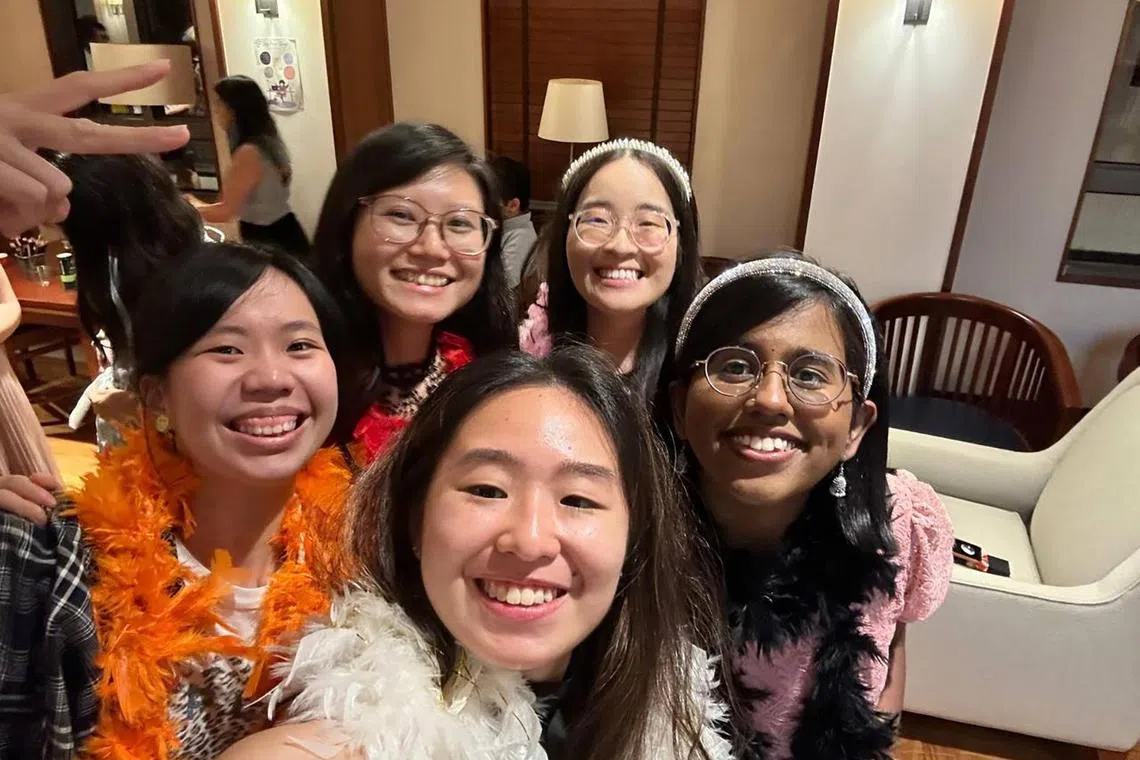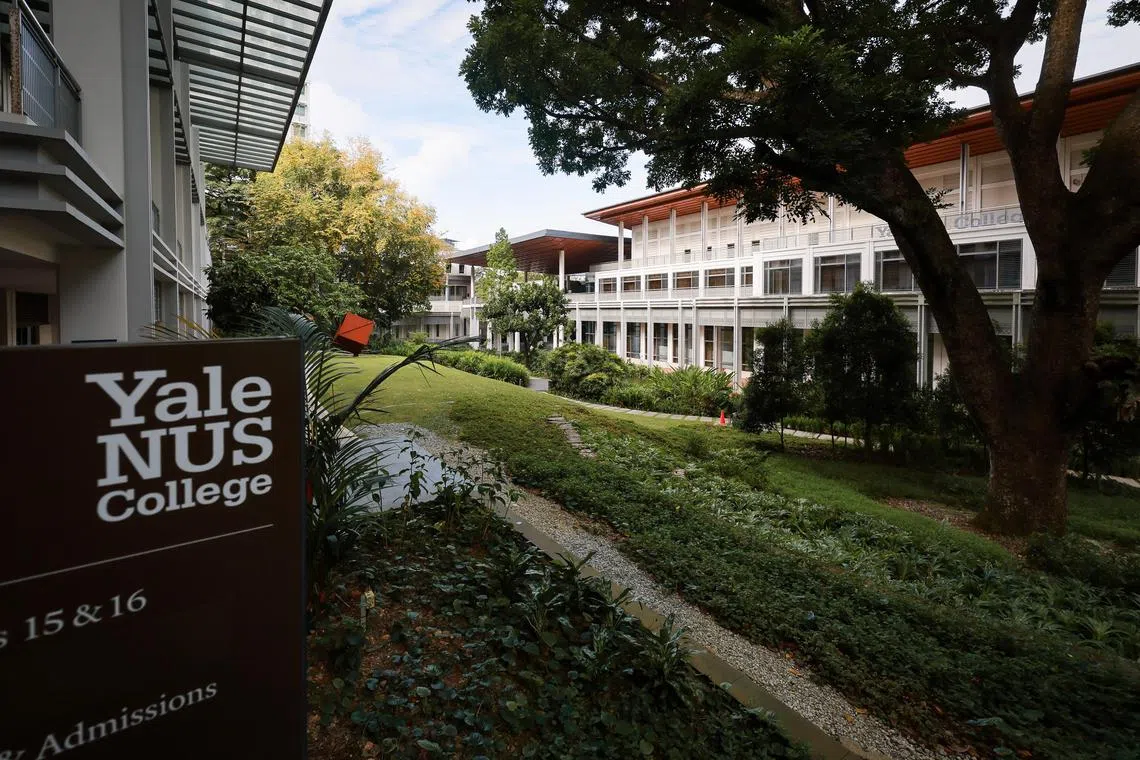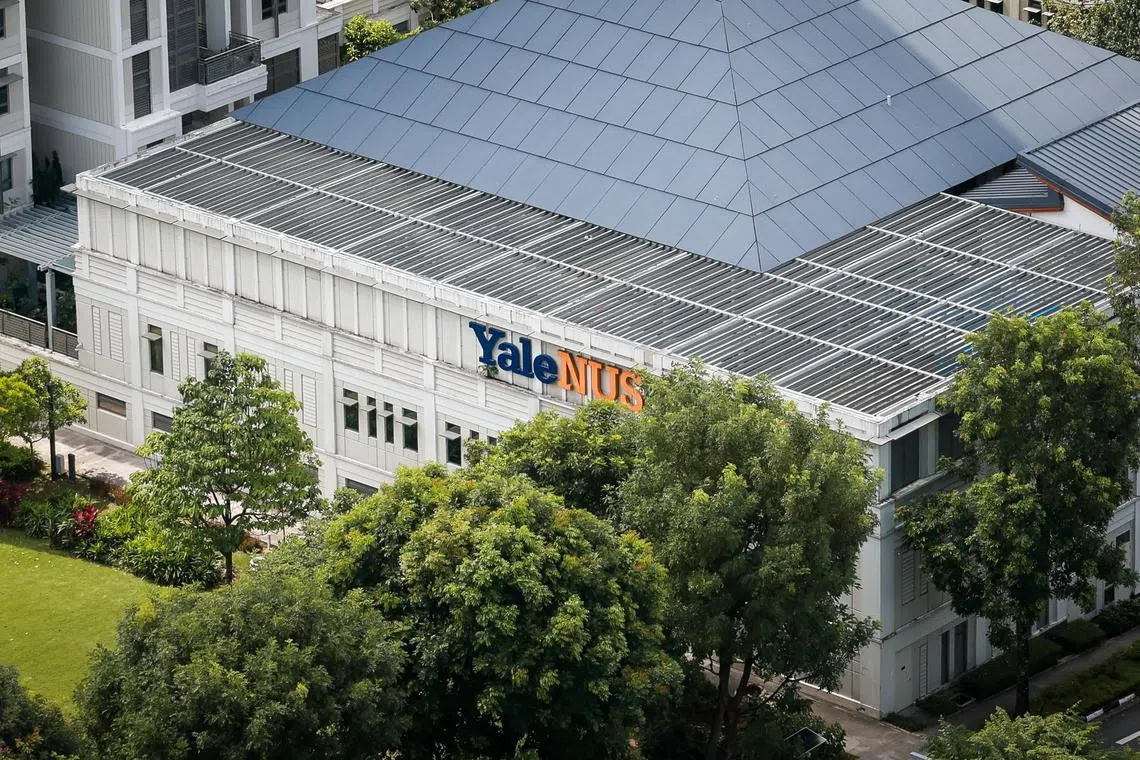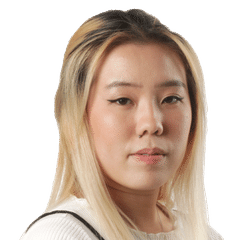‘Yale-NUS is its people’: Alumni, students, faculty reflect as it shuts down after June graduation
Sign up now: Get ST's newsletters delivered to your inbox

Yale-NUS alumni hope the values the college instilled, including open-mindedness, will continue to shape Singapore’s education landscape.
PHOTO: COURTESY OF AYYAPPAN MADHUMITHA
SINGAPORE – After the final batch of 257 students at Yale-NUS College graduate in June 2025, the liberal arts college will close its doors for good.
The campus has become much quieter, said final-year student Kimberly Quek, 25. But this also meant she got to know her peers much better, in a smaller and close-knit community.
“While the closure is undeniably unfortunate, I remain deeply grateful for the invaluable experiences and unwavering support I received during my time there,” she said.
The campus was also “noticeably less vibrant” compared with final-year student Ashvine Pandian’s first few years in the school.
Mr Ashvine, 24, who is majoring in philosophy, politics and economics at Yale-NUS, said this is because of the smaller student body, and also as students prepare to graduate while grappling with the looming closure of the school.
This quieter atmosphere on campus reflects a broader sentiment among students and alumni that The Straits Times spoke to – one of resignation and acceptance.
While many wish the circumstances were different, they want to preserve the college’s identity and ensure that its legacy endures.
An art exhibition, a performance and a book – these are some ways through which they are honouring the school before it shuts down.
More than 1,500 alumni and 90 faculty members will bid it farewell, marking the end of Yale University’s tie-up with National University of Singapore (NUS), which started in 2011.
Yale-NUS president Joanne Roberts said there is still some sadness about the closure.
“I do think that the community wishes that there had been an opportunity for them to give their inputs before the decision was made, and that I can understand.”
But the sentiment has also changed over time. “I think now, many people feel the way I do, which is grateful,” she said in an interview with ST on March 14.
Professor Roberts took over as the college’s president in 2022, a year after it was announced that it would stop accepting new students,

Yale-NUS alumnus Madhumitha Ayyapan (right) and her friends at the end-of-semester dinner organised by the residential college.
COURTESY OF AYYAPPAN MADHUMITHA
At the time, NUS president Tan Eng Chye and then Yale president Peter Salovey shared amicable comments about the end of the partnership. However, many students, alumni and faculty members felt blindsided, expressing anger and disappointment at the decision.
The announcement led to multiple town hall meetings and an online petition calling for a reversal of the decision,
For alumni like Ms Madhumitha Ayyappan, 25, who graduated in 2023, time has helped soften the blow of the college’s closure.
“A lot of reflection went into (dealing with the news), and knowing that life has to go on productively,” said Ms Ayyappan, who is a second-year medical student in the Yale-NUS and Duke-NUS Liberal Arts and Medicine pathway.
This pathway allows students to complete four years of undergraduate study at Yale-NUS before continuing directly to the Doctor of Medicine programme at Duke-NUS.
“Yale-NUS is its people – not the building, a single module, or the residential college experience. I love that the community is still going strong,” she said.
Ground-up initiatives to remember the college in the past year by students and alumni include an art exhibition called Magic Hour, a creative writing collection titled Unfold, and an ongoing performance exploring the significance of the college’s closure called May The Land.
A book, The First & Last Book, featuring interviews and photographs capturing life on campus, was also published together with faculty and staff.
Mr Khwa Zhong Xuan, 30, president of the Yale-NUS Club, the college’s independent alumni association, said that its focus is now strengthening the college’s alumni network.
“The immediate goal is ensuring alumni don’t just disperse but continue building and maintaining the community,” said Mr Khwa, who graduated in 2020 with a major in mathematics, computational and statistical science, and is now a senior data scientist at Grab.

The Yale-NUS College exercised more flexibility and allowed students to take alternative courses, including those from NUS, to fulfil their graduation requirements.
ST PHOTO: GAVIN FOO
The final year of the ‘Yale-NUS experience’
For students in the last few cohorts, Prof Roberts said the college tried to stay connected with them, addressing their concerns such as the courses they could take.
About 40 faculty members had resigned following the closure announcement, with 90 remaining on campus, said a spokeswoman for Yale-NUS. Many of the faculty have also since transferred to NUS.
Mr Ashvine said the fewer number of faculty members did not affect his choice of courses, and that the school opened up more courses to make up for the faculty who had left.
Similarly, Ms Quek said she still had a wide selection of courses as a life sciences major, because most of her professors were able to stay with them till the end as they held positions in NUS.
The college also exercised more flexibility and allowed students to take alternative courses, including those from NUS, to fulfil their graduation requirements.
There were also double the number of study-abroad opportunities at Yale and new global partners were introduced, allowing more students to conduct summer research at Yale or Harvard than ever before.
The last year of Yale-NUS has felt more intimate, said Prof Roberts. “It reminds me of that first cohort. They’re all in one dining hall, all using the same ‘buttery’… It’s a different type of experience, but with a different level of closeness.”
Students have “buttery nights” – or nights at Yale-NUS’ very own snack bar, Indomie suppers, and they “(dance) in the foyer late at night”, Prof Roberts added.
Some students had even asked if they could hold a murder mystery night in her apartment – which she agreed to – while others requested play dates with her pet dog. “There’s a nimbleness to things that wasn’t possible when the school was bigger,” she said.
At the same time, students are looking towards the future in anticipation.
Mr Ashvine said: “People are understandably more concerned with securing employment or grad school or something of the sort but are also trying their best to relish this last year of undergrad without any regrets.”
The future of liberal arts in Singapore
Mr Khwa believes the closure is a significant loss for Singapore’s liberal arts scene. “It was a unique programme, and it provided something very hard to find here.”
The college’s common curriculum was intentionally designed to help students think across disciplines, he said. While other universities allow students to take diverse courses, it does not mean they will naturally see the connections between them.
He added that the values of a liberal arts education – including the ability to challenge oneself and engage in difficult conversations when necessary – can be upheld by alumni as they gain influence in their careers.

The Yale-NUS College’s common curriculum was intentionally designed to help students think across disciplines, said one alumnus.
ST PHOTO: GAVIN FOO
For Mr Ryan Kueh, 28, who graduated in 2023 and was previously from Ngee Ann Polytechnic, Yale-NUS provided an academic space where students could freely debate ideas and engage in interdisciplinary discourse within a safe environment. He majored in politics, philosophy and economics.
“We dare to try and fail, and I see that conviction in my peers – we dare to do different things,” he said, describing the character of Yale-NUS students.
In 2024, Mr Kueh, an associate consultant at Bain & Co, published a book about the history of Singapore’s hawker culture, something he attributes to the confidence instilled in him by the college.
Alumni hope that the values Yale-NUS instilled – open-mindedness, diversity and a willingness to question the status quo – will continue to shape Singapore’s education landscape.
Ms Ayyappan hopes to bring to her future profession as a doctor what she learnt from her anthropology major – to have empathy and compassion.
“Liberal arts education should not be something that is accessible to only a certain class of people in Singapore,” she said.



